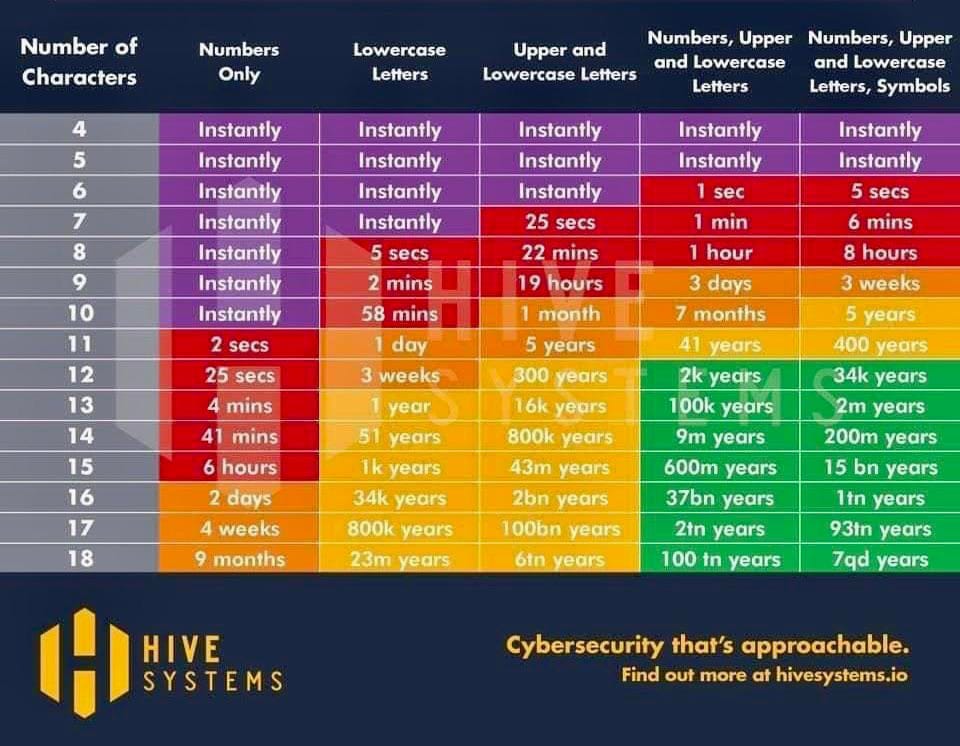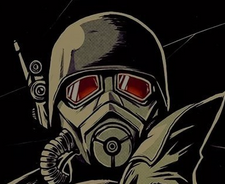Emojis are known to break systems in certain circumstances due to the way they’re interpreted in certain character sets.
I guarantee people doing this will not only lock out their own accounts, but may even freeze some authentication servers.
https://www.pcmag.com/news/want-to-brick-an-iphone-send-some-emojis
The website should feed your password straight into a well known hashing algorithm or key derivation function that has undergone a decade or more of careful scrutiny, without any other processing. The output will usually be a fixed length base64 or hex string.
There’s a short list of about three options that are currently considered acceptable, and a few more are probably fine but are a little too easy to crack these days (e.g. anything that shares the same math as bitcoin… what if someone throws a mining datacentre at your password?)
If the site breaks, maybe you don’t to be a customer of that service.
Can you still log in to wellsfargo accounts using the T9 translation of your password?
That only applies to iphones that came out 2016 or earlier and we’re never updated right?
Hahaha, I wish.
You would be amazed at how ancient and poorly maintained many web servers are on the modern internet. SQL injection still consistently make the top 3 web app vulnerabilities as of 2021. If that isn’t being sanitized properly I don’t expect emojis would be handled much better.
Thanks I wasn’t aware of that
For that particular bug, yes, but there have been many other variations on that theme and not limited to Apple tech. I’ve seen it nuke an email send for example because the SMTP server choked on emojis placed in a subject, to, or from line.
Thanks I appreciate the clarification
💯🐴🔋(umm, staple)
Correct horse battery staple!
But was it a 💯 or was it a ✅? Damn neither. Let’s try with 👍…
100 horse batteries
Just use a password manager, goddamn.
But only save emojis in it lol
Security expert reveals surprising way to induce headaches
No. There’s only one piece of advice that should be given to users in 2023 about how to make their passwords stronger:
Use a password manager
Just use 32 character random alphanumeric passwords that are unique for each site (you can do more like 12-16 characters if you’ll ever need to enter manually).
This is it. Stop trying to create clever passwords that you can remember. You aren’t as uniquely creative as you think and there’s been bodies of research into how the various things people do to create passwords that look secure can reduce the generation space so much that they become considerably easier to crack with an intelligent algorithm.
I got it to a stable 54% by using an
algorithm
typing f or d for consonants and vowels respectively in sentences I thought up, switching languages regularly,
and a stable 56% by just typing randomly and adjusting my patterns based on the colored output, which might have skewed my results. Certainly a very cool tool, I also liked the explanation linked on the page!
Oh for fuck’s sake, just turn on 2FA
Sounds great where it works but I’m sure most systems would reject an emoji or make you type out some overly complex password in addition to your emoji.
…no
I disagree with them.
- Emojis do not look the same on all platforms. Let’s take
white large square⬜ for example. Emojipedia shows what that emoji looks like on 26 different vendors. Some are pure white, some are shades are grey, and then there’s Microsoft who in its usual infinite wisdom decided it should be purple.large yellow square🟨 is a tossup between actually yellow and orange. This issue is also exacerbated with different displays displaying colours differently. Factors such as color accuracy, viewing angle, brightness affect how you perceive colour.

This also extends to face emojis.
grinning face with big eyes(Emojipedia link) isn’t that easy to tell apart fromgrinning eyes(Emojipedia link)- Emoji support depends on your device. I’m on Windows 11 22H2 which recently added support for
shaking face🫨. Problem is, Windows’ emoji pickerWin+.(period) doesn’t have it. Trying to login on a friends phone that’s still on iOS 15 or Android 12, beforeshaking facecame out? Enjoy manually copy/pasting the emoji from Emojipedia.
correct horse battery staple on the other hand looks the same on all devices.
- Emojis do not look the same on all platforms. Let’s take
Just use longer passwords?
What’s do you think is a good length? I think it has to be at least 10 but over 15 is much better.
Idk exactly how accurate this is but seems valid

So those annoying as hell “6 character, lowercase and uppercase letters, special character” passwords give a full 6 minutes of protection. Good to know.
It depends on how the password is stored / KDF used (what type of hash, salting, bcrypt, etc).
Judge for yourself if it’s an old website or old piece of software that might use (god forbid) MD5. Since one would not normally know that, I’d go with 20 (good, cryptographically) randomly generated upper/lower/digits if using a password manager, or 40ish characters passphrase if you need to remember and/or easily type it. Add some punctuation / special chars (spaces, commas, dots, paranthesis, etc) if it’s an important masterkey (ie password manager key, encrypted container, etc) and you have decent typing skills.
Some shitty sites / routers don’t accept certain special characters hence go with upper/lower/digits as standard but use longer lengths (if the shitty site allows you and doesn’t limit that too). Limits to what a password should contain and/or length limits would be a sign of lazy programming and poor password management, so treat them as unsecure from the get-go (yes, even big names like Oracle have piss-poor security or lazy implementation). Good programming nowdays shouldn’t have those limits, as user input sanitization / injection protection exists, and hash functions have a fixed length no matter what the input length is.
Also very important, don’t reuse passwords for online accounts. Hence a password manager remembering them for you. There are still websites storing passwords in plain text. You wouldn’t want your local pizza hut know or leak your email password by being hacked.
Rookie numbers. Max out the character limit.
Seriously tho: go for at least 80 bit randomized characters. If it’s something you have to type, use a couple of random words. Longer passwords are exponentially more secure.
All I can picture in my head is Matthew mcconaughey telling Leonardo DiCaprio he needs to masturbate more
As a software developer who has worked with a lot of symbols and emoji… PLEASE DON’T DO THIS.
Software doesn’t all handle these symbols the same way, and without tech knowledge (or even with) , it’s very possible to not be able to log in easily. I’m kinda drunk rn, but I’ll try to explain as simply as I can…
For example… skintone emojis are actually two characters, a face and a skin tone modifier. I think those ones are always two characters but some of these “multi-char” characters can be normalized into a single character. But not everyone handles this the same way. For example, Safari might normalize the emoji, but Firefox might treat it as two separate characters… And this would probably make your password not match. But basically… text has lots of edge cases; I’d advise to use normal passwords please (also maybe a password manager)
Was gonna say… you’re relying on the consistency of external emoji handlers that you don’t control. Ascii emojis are one thing.
Is my explaintion ok? The hard kombucha was… harder than I anticipated
It was pretty normal lol. Basically everything between the visual of an emoji and what “text” is entered is not in your control. So it’s great for security but not in practice as a password. What brand was the kombucha I want some.
I didn’t realize NYC has a physical Juneshine location. So I got a flight… and a Juneshine cocktail…
Thanks for the feedback! I’ll be sure to use non-printing characters instead of emojis for my passwords! (They can’t guess it if it’s invisible right?)
In all seriousness, why are people so adverse to using password managers? People are plenty willing to use the browsers built-in “remind my password” instead of a proper password solution such as bitwarden… And they come up with such “hacks” just to avoid using a proper length password.
Grab a sentence you know well.
Pick just the first letter of each word.
It will look like it’s random - for example “I like my lemmy only with beans and bacon” becomes “ilmlowbab” - and it comes from a far vaster possibility space (ever possible sentence and it need not even make sense) than that of “words in the English language and derived words” so it’s a lot harder to try to crack with a dictionary attack.
Also it works in everything that takes ASCII charactes (i.e. everything but numeric only pin codes).
A nice system
or just use special characters of languages like: ą, ę, ø, č
Do you have trouble on physical keyboards?
For petty services where you don’t want to have to break out the password manager, try making your own mental salted hash.
Pick four long words at random. Assign each of these to the four quadrants of the alphabet.
A-F - Equipment
G-M - Triumphant
N-S - Sampling
U-Z - Fatigued
Pick one number:
4
Now, take the first letter of the service that the password is for, and that selects your quadrant word. Take the number of letters in the service and multiply it against your number. Take the last letter of the service, and on your querty keyboard, move all the way to the right of thst line to select the first symbol there. Thats your unique password thats salted with yo ur personal words and number.
Facebook = Equipment32:
Lemmy = Triumphant20{
Pizza Hut = Sampling36{
If you want more security for these petty services, use longer words, bigger number, or use some other metric, Tweak the algorithm to make it unique to you. Maybe capitalize a middle letter in your salt word based on the length of the service name. Maybe add the first letter of the colour of the service logo to the password, EG
Facebook = Equipment32:B
Lemmy = Triumphant20{T
Pizza Hut = Sampling36{R
Petty services I would consider to be anything that’s not super critical, and is at a higher likelyhood of breaching my shit.
For banks, primary emails, or government services, use a more complex algorithm or a random string of chars from your password manager.
Just come up with one strong password (see https://xkcd.com/936/) for your password manager and use randomly generated passwords for everything else. There’s no reason to manually compute a hash every time you sign up for a service.
Also, for a non-remembering solution, use a security key with your password manager, the kind that plugs into USB and you have to tap a button to authenticate. Then you can generate a true random password and store it somewhere safe as a backup, and mainly use the key for day to day.
too short, for all that effort just use a sentence with a symbol and a number.
FacebookCanGoToHell!123 is more secure and easy to remember
Yeah putting the name of the service in the passphrase is actually pretty secure, unless the rest of the password is like “thisisapasswordforFACEBOOK” cause then one password gets leaked and the rest can be inferred.
Youre going to memorize a unique sentence for each service?
A method like this allows you to memorize only 4 words of arbitrary length, a number, and a simple algorthm to yield unique passwords for each service.
You can also add a standard phrase to all of them that is shared between them all just to make them more complex
Equipment32:thisismypassword
yes, it is what I do now. there was a time when people memorized 10, 15 phone numbers.
deleted by creator












